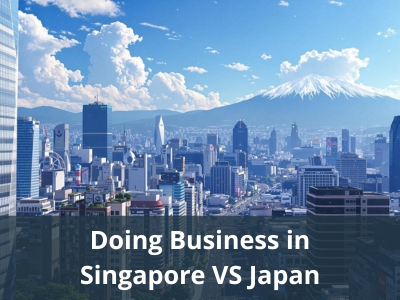Doing Business in Singapore VS Japan – A Comparison
 Entrepreneurs and investors looking to establish or expand their businesses in Asia often face a critical decision: should they choose Singapore or Japan? Both countries offer unique advantages, making the choice a challenging one. Singapore is renowned for its business-friendly environment, high quality of life, and cost-effective solutions for smaller enterprises. On the other hand, Japan boasts a robust economy, advanced technological infrastructure, and a rich cultural heritage that appeals to global investors. This article aims to provide a comprehensive comparison to help you make an informed decision.
Entrepreneurs and investors looking to establish or expand their businesses in Asia often face a critical decision: should they choose Singapore or Japan? Both countries offer unique advantages, making the choice a challenging one. Singapore is renowned for its business-friendly environment, high quality of life, and cost-effective solutions for smaller enterprises. On the other hand, Japan boasts a robust economy, advanced technological infrastructure, and a rich cultural heritage that appeals to global investors. This article aims to provide a comprehensive comparison to help you make an informed decision.
Key Comparison Points
Business Environment
- Singapore: Known for its political stability, transparent legal framework, and extensive government support for businesses, Singapore offers a secure and efficient environment for entrepreneurs.
- Japan: Japan provides a stable political climate and a well-established legal system, but its regulatory processes can be more complex and time-consuming compared to Singapore.
Taxation
- Singapore: With a corporate tax rate capped at 17%, various tax incentives, and no capital gains tax, Singapore provides a highly attractive tax regime for businesses.
- Japan: Japan has a higher corporate tax rate of approximately 30.62% and levies capital gains tax, which can make it less favorable for businesses seeking tax efficiency.
Ease of Company Incorporation
- Singapore: Singapore offers a seamless digital incorporation process, supported by a pro-business regulatory environment, allowing businesses to be set up quickly and efficiently.
- Japan: Incorporating a company in Japan can be more complex, with requirements for notarized documents and a longer processing time compared to Singapore.
Cost of Living and Business Operations
- Singapore: While living expenses can be high, the costs of setting up and running a small business are comparatively lower, with affordable office spaces and operational expenses.
- Japan: Japan offers a high standard of living but comes with higher operational costs, particularly in major cities like Tokyo and Osaka, where office rents are significantly higher.
Access to Markets
- Singapore: Strategically located in the heart of Asia, Singapore provides unparalleled global connectivity and benefits from numerous free trade agreements.
- Japan: Japan is a major economic hub with strong trade relationships, but its geographic location makes it less central for accessing other Asian markets compared to Singapore.
Quick Comparison Overview
Here’s a quick overview of the key differences for easy reference:
| Factor |
Singapore |
Japan |
| Business Environment |
Politically stable, transparent legal framework, pro-business policies |
Stable political climate, complex regulatory processes |
| Corporate Tax Rate |
17% |
30.62% |
| Capital Gains Tax |
No |
Yes |
| Ease of Incorporation |
Fast, digital, and business-friendly |
Lengthy and requires notarization |
| Business Costs |
Lower operational costs |
Higher operational costs |
| Market Access |
Strategic location, global connectivity |
Major economic hub, less central in Asia |

Benefits of Choosing 3E Accounting
Whether you’re looking to register a company in Singapore or start a business in Singapore, 3E Accounting offers unparalleled expertise and support. From seamless incorporation to comprehensive business solutions, our team ensures a hassle-free experience for entrepreneurs and investors.
Explore our Singapore company incorporation services package to understand how we can assist you. For more guidance, check out our guide to register a company in Singapore. Ready to take the next step? 3E Accounting is here to help. Contact us today to get started.
Ready to Expand into Singapore? Choose 3E Accounting Today!
Stay Secure, Stay Successful With 3E Accounting Services
Contact Us Now
Frequently Asked Questions
Singapore offers a politically stable environment, a transparent legal framework, and extensive government support, making it an ideal place for entrepreneurs. Learn more about starting a business in Singapore.
Singapore has a corporate tax rate capped at 17%, which is significantly lower than Japan’s approximate rate of 30.62%. For more details, explore our company registration guide.
Incorporating a company in Singapore is faster and more straightforward due to its seamless digital incorporation process. If you’re interested, check out our company incorporation in Singapore services.
Singapore has lower operational costs for businesses, including affordable office spaces, compared to Japan’s higher costs in cities like Tokyo and Osaka. For assistance, explore our company incorporation services.
Abigail Yu oversees executive leadership at 3E Accounting Group, leading operations, IT solutions, public relations, and digital marketing to drive business success. She holds an honors degree in Communication and New Media from the National University of Singapore and is highly skilled in crisis management, financial communication, and corporate communications.



 Entrepreneurs and investors looking to establish or expand their businesses in Asia often face a critical decision: should they choose Singapore or Japan? Both countries offer unique advantages, making the choice a challenging one. Singapore is renowned for its business-friendly environment, high quality of life, and cost-effective solutions for smaller enterprises. On the other hand,
Entrepreneurs and investors looking to establish or expand their businesses in Asia often face a critical decision: should they choose Singapore or Japan? Both countries offer unique advantages, making the choice a challenging one. Singapore is renowned for its business-friendly environment, high quality of life, and cost-effective solutions for smaller enterprises. On the other hand, 
